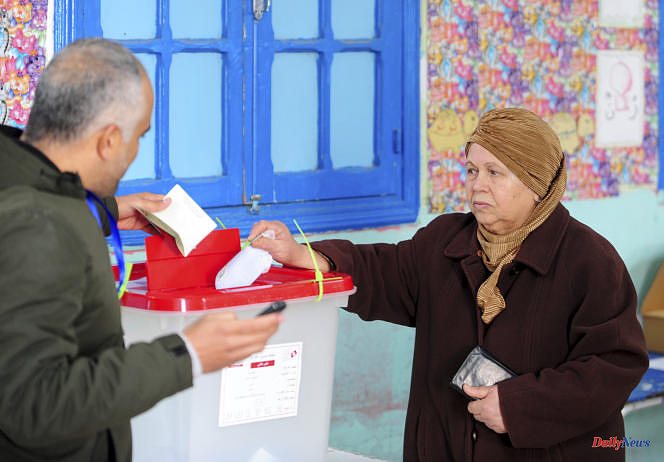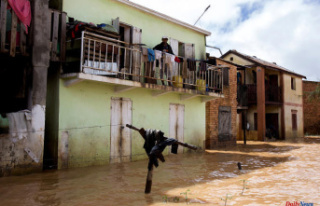In accordance with what was expected, very few Tunisians turned out on Sunday, January 29, to elect a Parliament devoid of real powers, inflicting a new disavowal on President Kaïs Saïed and the political reforms he has imposed since his coup de force in 2021. The president of the Isie electoral authority, Farouk Bouasker, announced a provisional participation rate of 11.3% in the second round of the legislative elections – it was 8.8% in the first round.
Participation was the main issue in the ballot, after an abstention of almost 90% in the first round, a record since the advent of democracy in the country cradle of the "Arab Spring" twelve years ago. The young people, who had brought Mr. Saïed to power in 2019, massively shunned the ballot box, as in the first round, with just under 5% of voters aged between 18 and 25.
The main coalition of opponents of Kais Saied called on the other parties and the powerful UGTT trade union center to join forces to get him out, after his "total failure" in the legislative elections. The UGTT this week launched an initiative to "save the country", forming a "Quartet" with the Tunisian League for Human Rights, the Bar Association and the socio-economic NGO FTDES, modeled on of the "Quartet" awarded in 2015 by the Nobel Peace Prize for his role in the Tunisian democratic transition.
Ahmed Nejib Chebbi, president of the National Salvation Front, of which the Islamist-inspired party Ennahdha is a member, asked the members of this "Quartet" to "work hand in hand to create change through the departure of Kais Saied and go to an early presidential election". "Today's results have once again proven the utter failure" of Kais Saied, Mr. Chebbi said. “Nearly 89% [of voters] turned their backs on this play and refused to participate in the process” of reforms launched by Mr. Saied. "This refusal confirms that Tunisia is going through a serious political crisis," he added.
The election boycotted by the opposition
The election of 131 deputies (out of 161 seats, 30 of which have already been filled) represents the final stage of the process launched eighteen months ago by President Kaïs Saïed to return to a hyper-presidentialist system, similar to the one before the 2011 revolution and the fall of dictator Zine El-Abidine Ben Ali. Considering the country ungovernable, Mr. Saïed seized all powers on July 25, 2021, then revised the Constitution last summer to abolish the hybrid parliamentary system in force.
Experts attributed the low attendance to various factors. First, despite strong divisions that prevent it from mobilizing in the street, the opposition, including Ennahda, the Islamist-inspired party that has dominated Parliament over the past decade, boycotted a ballot marking, according to it, the culmination of a "coup d'etat" by Mr. Saïed.
Another factor: the majority of the candidates were unknown and without political affiliation. The few voters therefore made personal choices. Belhassen Ben Safta, a 60-year-old taxi driver, voted to "never give the old [Ennahda] system a chance to come back." They are responsible for our misery." According to experts, part of the population, sharing Mr. Saïed's aversion to political parties, approves of his limitation of the powers of the future parliament. It will be very difficult for him to overthrow the government and it will be impossible for him to dismiss the president.
Inflation, unemployment and low growth
"Given the lack of interest of the population" for politics, "this Parliament will have little legitimacy, the president, all-powerful thanks to the Constitution of 2022, will be able to dominate it as he pleases", note for Agence France-Presse ( AFP) Youssef Cherif, expert from Columbia Global Centers. The attention of the 12 million Tunisians is elsewhere. “I never vote. All economic sectors are suffering and Saïed is not interested in it, ”denounces Mohamed Abidi, a 51-year-old waiter in Tunis.
Tunisians have seen their purchasing power plummet with inflation above 10% and endure shortages of subsidized foodstuffs such as milk, sugar or oil. For economists, they come from supply disruptions, because the State lacks cash to pay for these centralized purchases. Growth is sluggish (less than 3%), unemployment high (over 15%), poverty is on the rise and more than 32,000 Tunisians emigrated illegally last year.
Additional cause for concern: negotiations with the IMF for a loan of 1.9 billion dollars, key to other foreign aid, have stalled for months. This led the American agency Moody's to downgrade the rating of Tunisia's long-term debt by another notch on Saturday, judging "higher" the risk of default.
The blocking of the talks is said to be due to disagreements between President Saïed and his government on the program submitted to the IMF in exchange for its aid. Mr. Saïed is reluctant, according to experts, to adopt unpopular measures such as the lifting of subsidies on basic products and a restructuring of public companies that are over-indebted and overstaffed.












